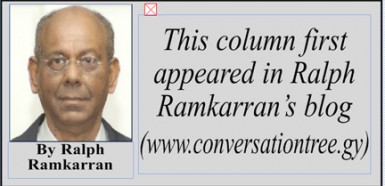Bryan Hunt has proven that you don’t have to dress like a diplomat to excel at being one. During the period that he has been here, particularly over the fourteen months that he performed the functions of the head of the US Mission, his steady and deft hand has helped to monitor both Guyana’s general and local government elections and stabilize relations with Guyana after accusations by the previous government against Ambassador Brent Hardt of interfering in Guyana’s internal affairs. Of course, the change in government has helped.

In his farewell speech at a function at the US Ambassador’s residence on Friday evening, Mr Hunt listed several issues that he considered of importance for Guyana. He said that “the choices that are made today and the actions taken will determine which trajectory Guyana follows.” The issues are constitutional reform, an end to winner-take-all politics, steps to end corruption and enhance transparency and accountability, construction of the Lethem road and a deep water harbour, an end to violence against women and children and an end to discrimination against the LGBT community. I have written in support of all of these issues but I am particularly pleased that Mr Hunt called for constitutional reform.
At an informal gathering with a senior foreign government official who was recently visiting Guyana, I expressed the view that the diplomatic community needs to publicly get behind the drive for real constitutional reform. In making the suggestion I was motivated by an example of diplomatic influence on political developments having an impact. President Jagdeo persuaded the PPP to adopt the policy contained in the paper ‘Towards Greater Inclusive Governance in Guyana’ announced by him on February 8, 2003, at State House on the ground, among other things, that diplomatic pressure was being exerted.
But while there is a growing consensus that Guyana cannot move forward without constitutional reform that reduces the grip of the winner-take-all system, it is constrained by the politics of power. If the reader is not convinced by that argument let us ask the two main political parties one question each and contemplate the possible answer. Question to APNU: Are you prepared now to give up close to half of your government ministries to the PPP? Question to the PPP: Having regard to your belief that you will win the next general elections, are you prepared now to negotiate giving close to half of your government’s ministries to APNU if you win? Unless there is an unconditional ‘yes’ answer to these questions by each political party, (there will necessarily be qualifications and conditions) constitutional reform of the depth we are talking about is not likely to happen without pressure. Guyana will therefore need all the help it can get, including a major push by the diplomatic community.
It was the PPP that first challenged the winner-take-all system in 1977 with its proposals for a National Patriotic Front Government. Cheddi Jagan and the PPP consistently campaigned since that time for the abolition of winner-take-all and Jagan last spoke about it 1991. During his presidency from 1992, faced with great PNC hostility and PPP’s triumphalism, the most he could do was to promote what became known as the ‘Mandela Formula’ which was the basis of a unity government in South Africa in the process of dismantling apartheid.
From the late 1990s a group of young PNC leaders began to publicly urge support within their own party and from the public for ‘shared governance.’ A paper was circulated and in 1999 the group gave evidence before the Constitution Reform Commission in support of their proposals. The then Leader of the PNC and of the opposition, who had hitherto opposed the idea, finally came around in 2002 when he publicly declared support for it, even though in the ensuing years he did nothing to promote it. The idea was eventually dropped from the front burner.
Apart from his work in promoting development in Guyana and US-Guyana relations, Bryan Hunt has done us an enormous service by publicly supporting an end to winner-take-all politics by way of serious constitutional reform. In the recent past this might well have been considered an internal matter about which such public diplomatic comment would be inappropriate. But two considerations apply. Firstly, for many years the range of matters that had been considered to be internal affairs in the diplomatic world has shrunk considerably. Secondly, Bryan Hunt has earned the warm friendship of the Guyanese people. He is therefore permitted to take liberties. We wish him and Haroun well.




